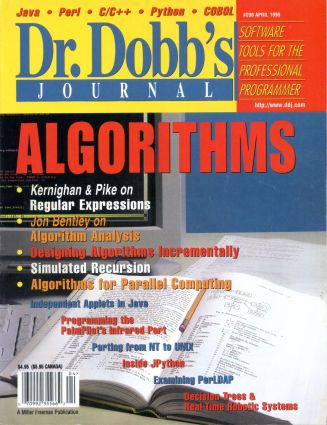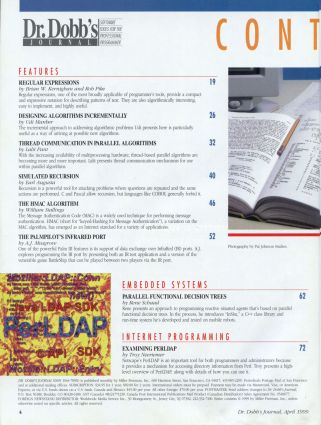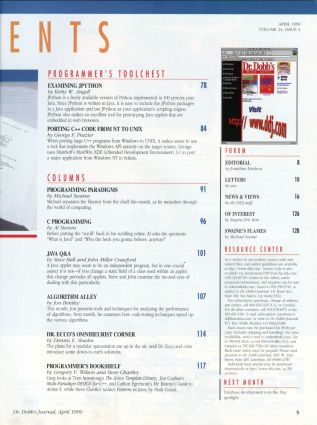
p.8 EDITORIAL
[author : Jonathan Erickson] #Edito
TABLE OF CONTENTS
FEATURES
p.19 REGULAR EXPRESSIONS
[author : Brian W. Kernighan and Rob Pike]
Regular expressions, one of the most broadly applicable of programmer's tools, provide a compact and expressive notation for describing patterns of text. They are also algorithmically interesting, easy to implement, and highly useful. Brian and Rob, who are researchers at Bell Labs and the authors of The Practice of Programming, present a compact implementation of grep that uses regular expressions.
p.26 DESIGNING ALGORITHMS INCREMENTALLY
[author : Udi Manber]
The incremental approach to addressing algorithmic problems Udi presents here is particularly useful as a way of arriving at possible new algorithms.
p.32 THREAD COMMUNICATION IN PARALLEL ALGORITHMS
[author : Lalit Pant]
With the increasing availability of multiprocessing hardware, thread-based parallel algorithms are becoming more and more important. Lalit presents thread communication mechanisms for use within parallel algorithms.
p.40 SIMULATED RECURSION
[author : Earl Augusta]
Recursion is a powerful tool for attacking problems where questions are repeated and the same actions are performed. C and Pascal allow recursion, but languages like COBOL generally forbid it.
p.46 THE HMAC ALGORITHM
[author : William Stallings]
The Message Authentication Code (MAC) is a widely used technique for performing message authentication. HMAC (short for "keyed-Hashing for Message Authentication"), a variation on the MAC algorithm, has emerged as an Internet standard for a variety of applications.
p.52 THE PALMPILOT'S INFRARED PORT
[author : A.J. Musgrove]
One of the powerful Palm III features is its support of data exchange over InfraRed (IR) ports. A.J. explores programming the IR port by presenting both an IR test application and a version of the venerable game BattleShip that can be played between two players via the IR port.
EMBEDDED SYSTEMS
p.62 PARALLEL FUNCTIONAL DECISION TREES
[author : Rene Schaad]
Rene presents an approach to programming reactive situated agents that's based on parallel functional decision trees. In the process, he introduces "InSitu," a C++ class library and run-time system he's developed and tested on mobile robots.
INTERNET PROGRAMMING
p.72 EXAMINING PERLDAP
[author : Troy Neeriemer]
Netscape's PerLDAP is an important tool for both programmers and administrators because it provides a mechanism for accessing directory information from Perl. Troy presents a high-level overview of PerLDAP, along with details of how you can use it.
PROGRAMMER'S TOOLCHEST
p.78 EXAMINING JPYTHON
[author : Kirby W. Angell]
JPython is a freely available version of Python implemented in 100 percent pure Java. Since JPython is written in Java, it is easy to include the JPython packages in a Java application and use JPython as your application's scripting engine. JPython also makes an excellent tool for prototyping Java applets that are embedded in web browsers.
p.84 PORTING C++ CODE FROM NT TO UNIX
[author : George F. Frazier]
When porting large C++ programs from Windows to UNIX, it makes sense to use a tool that implements the Windows API natively on the target system. George uses MainSoft's MainWin XDE (eXtended Development Environment) 3.1 to port a major application from Windows NT to Solaris.
COLUMNS
p.91 PROGRAMMING PARADIGMS
[author : Michael Swaine]
Michael separates the blarney from the chaff this month, as he meanders through the world of computing.
p.96 C PROGRAMMING
[author : Al Stevens]
Before putting the "scroll" back in his scrolling editor, Al asks the questions "What is Java?" and "Who the heck you gonna believe, anyway?"
p.101 JAVA Q&A
[author : Steve Ball and John Miller Crawford]
A Java applet may seem to be an independent program, but in one crucial aspect it is not—if you change a static field of a class used within an applet, that change pervades all applets. Steve and John examine the ins-and-outs of dealing with this particularity.
p.107 ALGORITHM ALLEY
[author : Jon Bentley]
This month, Jon presents tools and techniques for analyzing the performance of algorithms. Next month, he examines how code-tuning techniques speed up the various algorithms.
p.114 DR. ECCO'S OMNIHEURIST CORNER
[author : Dennis E. Shasha]
The plans for a modular spacestation are up in the air, until Dr. Ecco and crew introduce some down-to-earth solutions.
p.117 PROGRAMMER'S BOOKSHELF
[author : Gregory V. Wilson and Steve Chartley]
Greg looks at Tom Armstrong's The Active Template Library, Jim Coplien's Multi-Paradigm DESIGN for C++, and Carlton Egremont's Mr. Bunny's Guide to Active X, while Steve Chartley tackles Patterns in Java, by Mark Grand.
FORUM
p.10 LETTERS
[author : you]
p.16 NEWS & VIEWS
[author : the DDJ staff]
p.126 OF INTEREST
[author : Eugene Eric Kim]
p.128 SWAINE'S FLAMES
[author : Michael Swaine]

